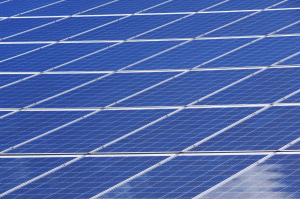
August 12, 2021 | back to news

"To flip the switch on climate change, we need a grid that's chock full of renewable energy that's also cheap and accessible," said Secretary of Energy Jennifer M. Granholm. "The universities, small businesses, and national lab behind these projects are building the critical components of America's future grid, making it more resilient on our way to a 100% clean power system."
Renewable energy is America's largest source of new electricity generation, with hundreds of gigawatts of solar and wind expected to come online in the next 15 years. Maintaining a reliable, high-renewable grid requires technologies and industry standards that can seamlessly coordinate renewable resources and restart the grid if it goes down. When the power goes out today, a grid operator must first turn on a spinning turbine often times from a coal or gas-fired power plant that sends a signal for other power sources to match. Grid-forming inverters will allow renewable sources to create that signal, eliminating the need for a turbine.
The selected projects will:
- Create a public-private consortium on grid integration technology (Award amount: $25 million) - The National Renewable Energy Laboratory, the University of Washington, and the Electric Power Research Institute will co-lead an industry-wide consortium to advance research on grid-forming inverters -- an emerging technology that allows solar and other inverter-based energy sources to restart the grid without a spinning turbine, typically a oil or coal-fired power plant. This consortium will include national labs, universities and minority-serving institutions, equipment manufacturers, utilities, and bulk power system operators.
- Provide utilities better data about rooftop solar power generation (Award amount: $6 million) - Two projects led by GridBright, Inc. (Alamo, California) and the University of Pittsburgh (Pittsburgh, Pennsylvania) will develop sensor hardware and system designs that will help utilities understand how much renewable energy is being generated by residential and commercial solar photovoltaics, strengthening reliability of the electricity grid.
- Advance the commercialization of American-made solar innovations (Award amount: $14 million) - Nine solar hardware and manufacturing projects will receive DOE funding to accelerate the commercialization of innovative technologies that can lower the cost of solar technologies and help to integrate solar electricity into the nation's energy grid. Among the projects include a new solar heat system to dry out sewage and convert it to fertilizer, which would help decarbonize the agricultural, wastewater, and industrial sectors and a project to develop a low-cost device to help prevent solar system electrical fires.
"Investments in clean and renewable energy infrastructure are a big reason why Washington state continues to lead in innovation and technological development. I am so glad to see this important funding go towards projects that will promote energy security, meet domestic demands, and create good-paying manufacturing jobs. This is an important step towards ensuring Washington state leads in solar energy and grid reliability," said U.S. Senator Patty Murray (WA).
A video on "What is Grid Integration?" may be viewed here
The projects are part of DOE's Solar Energy Technologies Office Fiscal Year 2021 Systems Integration and Hardware Incubator funding program of the Office of Energy Efficiency and Renewable Energy (EERE). EERE's mission is to accelerate the research, development, demonstration, and deployment of technologies and solutions to equitably transition America to net-zero greenhouse gas emissions economy-wide by no later than 2050.
Learn more about these projects, the DOE Solar Energy Technologies Office's research priorities in manufacturing and competitiveness and systems integration, and EERE's Wind Energy Technologies Office.
Source: U.S. Department of Energy